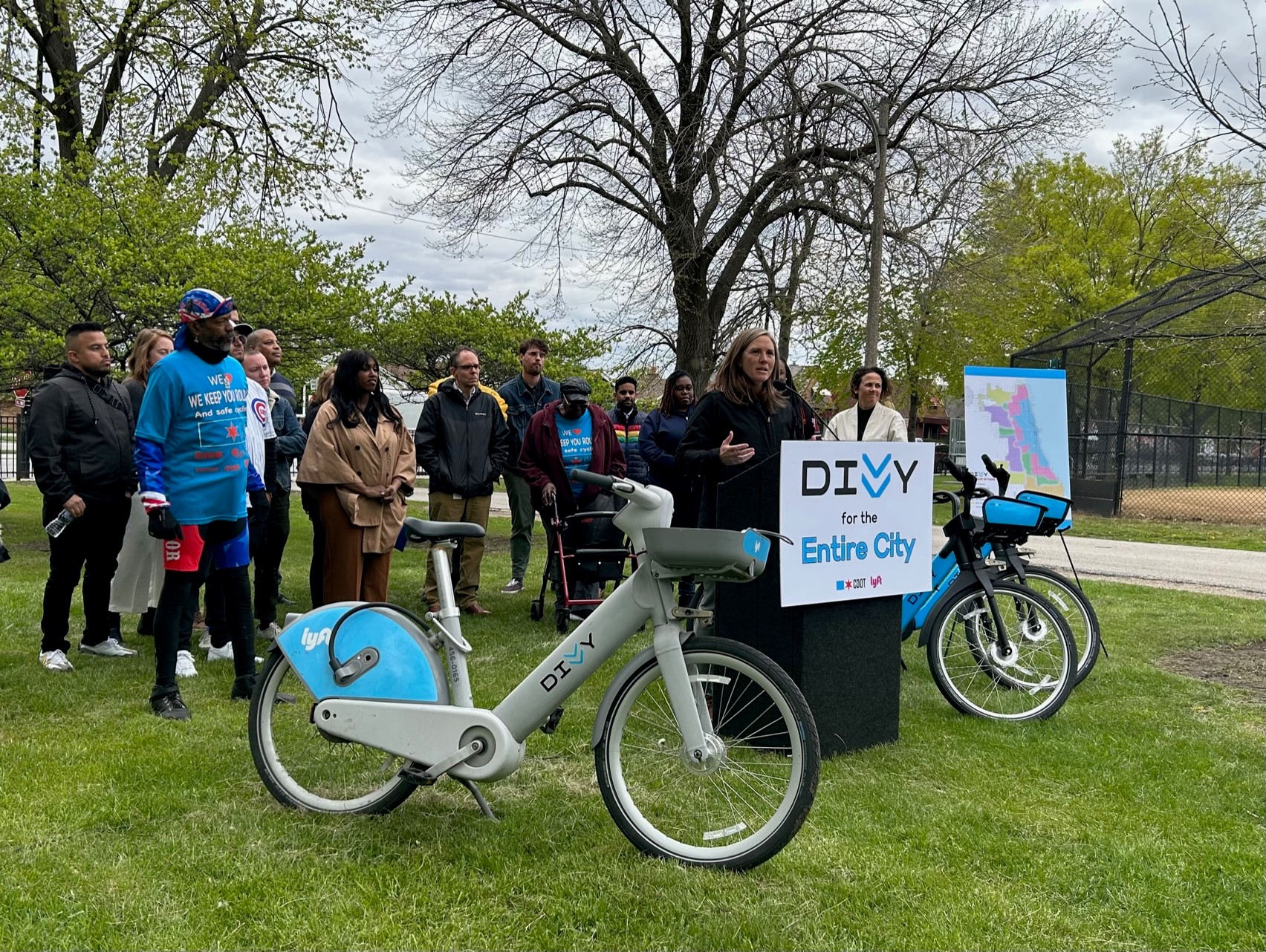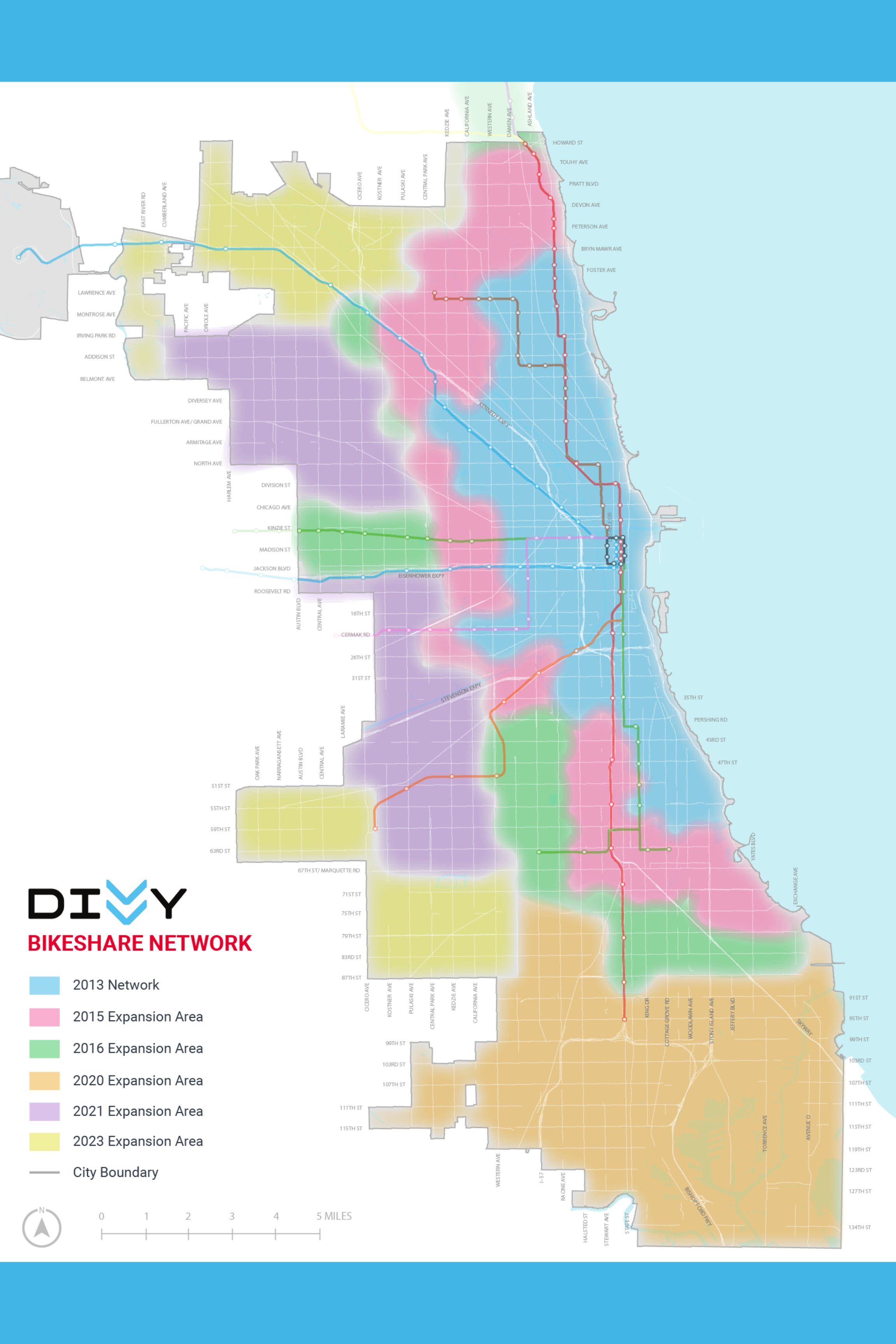Divvy for the Entire City: Divvy Service Hits All 50 Wards
Service area is now 234 square miles - the largest by area in North America. And as part of expanding operations citywide, Divvy will grow its fleet of classic bikes and add new stations on the Northwest, Southwest and Far South Sides

Chicago – The Chicago Department of Transportation (CDOT) announced today that Divvy, the city’s bikeshare system, is now operational throughout all of Chicago. Announced at an event in Dawes Park on Chicago’s Southwest side with operating partner Lyft, Divvy ebikes can now begin and end rides across the entire city. To improve service for riders in neighborhoods newly served by Divvy, Lyft has installed 100 new bike racks and decaled 233 existing city bike racks to designate them as free Divvy ebike parking. Locations of the bike racks can be found in the Divvy and Lyft apps and at divvybikes.com. Additionally, over the next two years, up to 250 traditional Divvy stations will be installed to both expand and densify the network. Finally, nearly 3,000 new classic bikes will be added to the fleet.
“Beginning today, no matter where you’re traveling to in Chicago, you can get there on a Divvy bike,” said CDOT Commissioner Gia Biagi. “Divvy has become an invaluable part of our city’s transportation network over the last decade. As we work to make Chicago the best big city for biking in the country, we are not only bringing Divvy service to every ward in Chicago, but are continuing to invest in the system, with more bikes and new stations to make bikeshare more convenient and accessible.”
“We have reached an incredible milestone, with Divvy service now available citywide,” said Caroline Samponaro, VP of Transit, Bike and Scooter Policy at Lyft. “Along with our partners at the City, we made a commitment to Chicagoans to expand and modernize Divvy, to ensure that it is an affordable and convenient extension of the public transportation network. Today, we deliver on that promise and chart a course for the next round of network improvements.”
Divvy for the Entire City
In addition to expanding operations citywide today, Divvy will continue to strengthen its network with the addition of up to 250 new stations to be installed over the 2023 and 2024 riding seasons, including:
- New stations in the Northwest, Southwest, and Far South Sides of the city to expand stations to new neighborhoods and increase the density of stations in areas already served by Divvy.
- Begin converting e-bike-only parking stations to traditional Divvy stations so that residents will have more options to choose their preferred device, be it a classic bike or an ebike.
- Kicking off an extensive community engagement process to select sites for new stations.
- The addition of nearly 3,000 new classic bikes to the fleet throughout the 2023 and 2024 riding seasons.
"We need more than just a beautiful trail, we need a way for people to access and enjoy it - so the expansion of Divvy coverage is great! We don’t just advocate for improving the Major Taylor trail; our mission includes improvements and economic development in all the communities and surrounding neighborhoods that touch the trail. Having Divvy bikes in this community is a step in the right direction because more bikes and stations mean more riders and more ways for folks to ride on the South Side,” said Dr. Brenda M, Dixon, Secretary of Major Taylor Cycling Club Chicago, Vice President of Friends of the Major Taylor Trail and President of Major Taylor Trail Keepers Chicago Organizations.
“We’re thrilled to see Divvy now serving every Chicago neighborhood,” said Amy Rynell, Executive Director at Active Transportation Alliance. “This Divvy expansion will increase transportation options and help fill the gaps in the critical first/last mile connection to public transit in Chicago neighborhoods. Increased access to bikes paired with rapid deployment of safe infrastructure for people walking and biking across the city are crucial to realizing a truly multimodal vision for the future of Chicago’s transportation network.”
With this momentous milestone achieved today, Divvy continues to be one of the most successful bikeshare programs and the first in the United States to incorporate docked scooters and charging stations.
- In 2022, Divvy hit a record high of more than 6.3 million bike and scooter trips, over 60 percent higher than 2019.
- Ridership is up nearly 40 percent so far this year over last year.
- Last year Divvy had nearly 550,000 unique riders and reached over 43,000 members.
- Since 2020, the number of Divvy for Everyone (D4E) members has quadrupled to 8,000. D4E offers heavily reduced-cost memberships and rides for income-qualifying Chicagoans.
- Chicagoans of color now make up the majority of ridership.
- The system currently has more than 800 stations, and over 15,000 bikes and scooters.
- Over 90 percent of bike and scooter rides start or end at a station.
- Divvy is the largest bikeshare system by area in North America, now covering 234 square miles.
Expanding the network of low-stress bikeways
This boom in cycling has been a result of the City’s investment in more and better bike infrastructure, with an emphasis on low-stress bikeways that make cycling a safe and comfortable option for people of all ages and abilities.
Chicago’s bike network includes more than 420 miles of on-street bikeways and off-street trails. The network has grown by 100 miles since 2019, with low-stress bikeways (neighborhood greenways, protected bike lanes, and off-street trails) growing faster than other bike facilities. Nearly 75 percent of the bike network growth since 2019 has been on the South and West sides.
Earlier this year, CDOT released the Chicago Cycling Strategy, outlining its community-driven approach to expanding Chicago’s bike network and creating a more equitable, safe, and inviting city for cycling. The strategy outlines 150 miles of new bikeways CDOT plans to implement in the coming years, including important citywide connections and neighborhood routes that connect people to local destinations important to them. Along with expanding the network, CDOT is improving existing bike lanes through its program to upgrade all existing delineator-protected lanes to concrete-curb, providing significant safety and comfort improvements for all road users.

